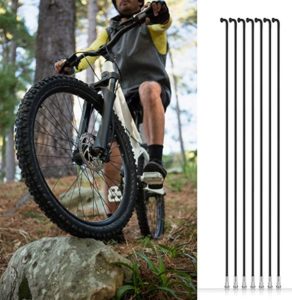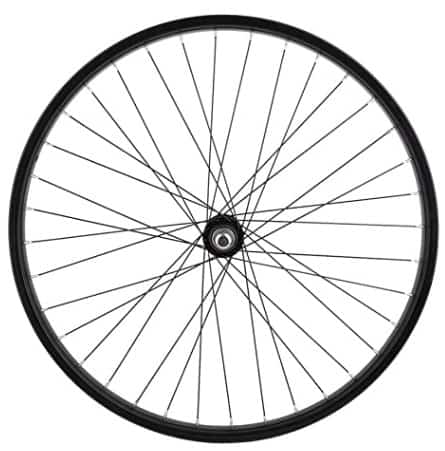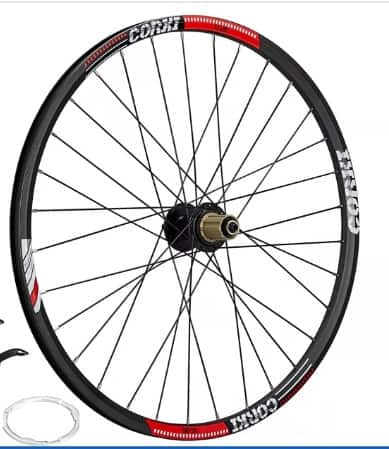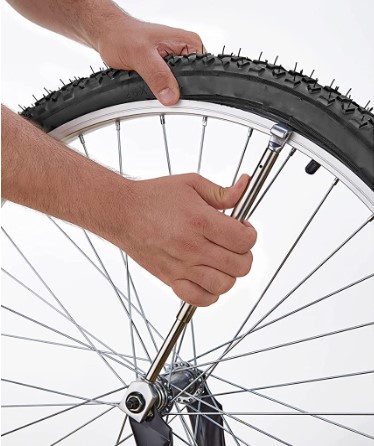For so many years, 36-spoke (36H) wheels were seen as the standard wheels. Today, however, 32-spoke (32H) wheels are arguably the new standard. So, the 32 vs 36 spokes battle is livelier than ever, forcing one to wonder, ‘which between 32H and 36H is better?’
Under fair conditions (such as the same rim, wheel size, hub, and spoke material), 36-spoke wheels are stronger and more resilient than their 32-spoke counterparts. However, 32-spoke wheels are generally lighter and more aerodynamic than 36-spoke wheels.
So, clearly, the rim, wheel size, hub, and spoke material have a say when comparing 32H with 36H wheels. I’ll shed more light on that in a few.
But before we can compare them, let’s first understand what spokes are and their role on the bike wheel.

So, what is a spoke?
Spokes are the wire rods running from the wheel center to the outside edge. Essentially, spokes perform these roles:
- Strengthen the rim
- Support the weight you place on the wheel
- Transfer leg power from the hub to the rest of the wheel
32 Vs 36 Spokes – The Comparison
Let’s compare the two under the following:
a) Wheel Strength
Under fair conditions, wheels with a high spoke count are stronger than those with fewer spokes.
But what do I mean by ‘fair conditions?’ Well, I’m talking about both wheels being of the same size and having the same hub, rim, and spoke material.
In such a case, the wheel with more spokes (the 36H wheel) is measurably stronger than the one with fewer spokes (the 32H wheel).
The four extra spokes make 36H wheels truer, thus more robust. After all, spokes are meant to strengthen the wheel and support the load placed on the wheel.
b) Wheel Resilience
Essentially, having more spokes also mean extra resilience. For example, losing two spokes on a 36H wheel may not be as detrimental as losing the same number on a 32H wheel.
That’s because the more the spoke count, the more resilient the wheel is.
That explains why most touring bikes’ wheels have 36 spokes. You can ride your bike with a broken spoke without compromising the wheel’s integrity. I call that resilience!
c) Spoke Tension
Overall, 36 spokes reduce the spoke tension of a wheel more than 32 spokes. As a result, you are likely to have a smoother and more compliant ride with a 36H wheel than a 32H wheel.
Since spokes support the load on the wheel, having fewer spokes (32) means more tension, and thus, the likelihood of the spokes breaking is higher when there are 32.
d) Wheel Weight
Now, here comes the shortcoming of 36-spokes. With the average spoke weighing 15g, a 36-spoke wheel is likely to be 60g heavier than a 32-spoke wheel.
That’s if everything else (spoke material, wheel strength, and rim) is equal.
It’s due to that reason that the industry is switching from 36H to 32H wheels. Each day, 36-spoke wheels are becoming scarcer by the day as riders prefer lighter wheels over heavier ones.

e) Air Resistance
Another area where a 32-spoke wheel beats a 36-spoke wheel is the wheel’s aerodynamics. Though most cyclists are unlikely to notice the difference, the more the spoke count, the more the air resistance.
That means you will likely suffer more wind drag with a 36H wheel than with a 32H wheel.
Note, however, that the spoke number only affects the aerodynamics of the wheel by 10%. The rims shape and depth contribute to the majority percentage.
32 Vs 36 Spoke Suitability
Touring – 32 or 36 Spokes For Touring?
Touring bikes are generally stronger than traditional road bikes, and that means they need equally stronger wheels.
Overall, given that 36H wheels have more spokes, they are naturally stronger than their 32H counterparts under the same conditions.
But also, 36H wheels are more resilient, like I mentioned, thus the better choice for touring. You’ll, however, have to deal with extra wheel weight as more spokes mean more load.
It, however, doesn’t mean that you cannot use 36H wheels on a touring bike. After all, it’ll make you lighter even if you’ll have to sacrifice a bit of strength for a bit of speed.
Mountain Biking – 32 Or 36 Spokes for Mountain Biking?
All conditions equal; 36-spoke wheels are stronger than their 32-spoke counterparts. For that reason, a 36H wheel is expected to be superior off-road.
But since there is more to the wheel strength than the spoke count, it’s not fair to conclude that a 36H wheel is better for mountain biking than a 32H wheel.
The rim and hub need to be more robust to enable you to conquer the off-road, regardless of the spoke number.
Commuting – 32 Spokes Vs 36 Spokes for Commuting
Both 36H and 32H wheels are decent for commuting. It all depends on what is essential to the commuter.
While a 6H wheel offers you more strength and resilience, a 32H wheel offers you a slight aerodynamic advantage.
In that case, if you are a commuter who likes carrying some load, a 36H wheel is ideal. But if you prefer to ride light and fast, then go for a 32H wheel.

So, Is The Spoke Count All That Matters?
The answer is no. Here are things worth knowing.
· The Rim is Integral
While the spokes reinforce the wheel, you can only have a stronger wheel if the rim is equally strong.
In that case, a 32-spoke wheel with a high-quality rim is more robust than a 36-spoke wheel with an inferior wheel.
So, it doesn’t mean that all 36-spoke wheels are more robust than all 32-spoke wheels just because they have more spokes.
· The Wheel Size is Equally Important
The spoke count notwithstanding, smaller wheels are naturally stronger than bigger wheels. In that case, a bigger wheel needs more spokes to be truer and acquire more strength.
· The Hub Has a Role to Play
When it comes to the hub, the narrower it is, the weaker the wheel is likely to be regardless of the spoke number.
Additionally, hubs sealed against bad weather usually are more robust, and they, in turn, make the wheel stronger.
· The Spoke Material Matters Too
When it comes to the spoke material, there is only one option, and that is steel. However, you may have to choose between stainless steel and high-carbon steel.
Overall, stainless steel spokes are thinner than carbon steel spokes, and therefore they suffer less wind drag.

32 Vs 36 Spoke Wheels FAQs
1. Are 36 Or 32 Spokes Better?
Under the same conditions, 36 spokes are more robust than 32 spokes. That includes having the same wheel size, rim, hub, and spoke material.
Overall, 36 spokes are best for touring while 32 spokes suit commuters more.
2. Do More Spokes Make A Wheel Stronger?
If all conditions are even (the rim, hub, wheel size, and spoke material), having more spokes means having a stronger and more resilient wheel.
But if the conditions are not equal, then a more robust rim and hub make a stronger wheel than extra spokes.
3. How Do I Know What Size Spokes I Need?
You can know what size spoke you need by checking the wheel’s manual. Alternatively, you can check online using a spoke calculator like DT Swiss.
A spoke calculator allows you to enter your wheel details and then determine your spoke size.
4. Is It Better To Have More Or Fewer Spokes?
Having fewer spokes means the wheel’s load is concentrated on a smaller area, while more spokes indicate the load is evenly distributed.
That means more spokes equal a stronger wheel if the rim is equally stronger. The downside is that the wheel becomes heavier.
So, on the flip side, fewer spokes equal a lighter wheel.
5. How Many Spokes Do You Need For Touring?
Since you need more strength and resilience from your wheel to complete a biking tour, the more the spokes, the better it is for you.
Anything from 32 will do but note that the more spokes you use, the heavier the wheel becomes.
6. What Are The Strongest Spokes?
Overall, the strongest spokes are steel in build and easy to fit. They should preferably come with nipples for easy fitting.
One option that offers you that is the SENQI 36 Pcs J-Bend Bicycle Steel Spokes (View on Amazon).
Included are 36 steel spokes and 36 nipples. Overall, they are the best spokes for touring and mountain biking because of their strength and resilience.
For more high-quality steel spokes, click here to see what customer are saying about them on amazon.
7. Which Is Better 32 Hole Or 36 Holes?
If the conditions are the same, 32 holes are lighter (by four spokes) than 36 holes. However, that also means they are less strong.
8. Are Fewer Spokes Faster?
Given that the average spoke weighs 15g, fewer spokes means a lighter wheel, and a lighter wheel is a faster wheel.
Relevant Post: Is A Spoke Protector Necessary?
Closing Thought:
You now understand the 32 vs 36 spokes battle. You can thus use the information to decide which between the two suits your cycling needs more. Once you decide on that, you can go ahead and get it.